
Islamia College Peshawar (ICP) is a public university located in Peshawar, Khyber Pakhtunkhwa, Pakistan.

Abul Kasem Fazlul Huq, popularly known as Sher-e-Bangla, was a Bengali lawyer and politician who presented the Lahore Resolution which had the objective of creating an independent Pakistan. He also served as the first and longest Prime Minister of Bengal during the British Raj.
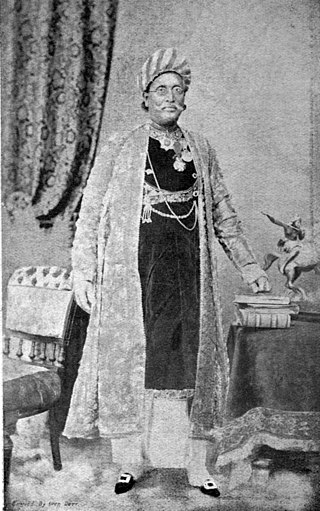
Nawab Bahadur QaziAbdul Latif was a Bengali Muslim aristocrat, educator and social worker. His title, Nawab was awarded by the British in 1880. He was one of the first Muslims in 19th-century India to embrace the idea of modernisation.
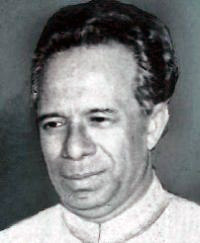
Humayun Kabir (1906-1969) was an Indian educationist and politician. He was also a poet, essayist and novelist in the Bengali-language. He was also a renowned political thinker. He was educated at Exeter College, Oxford and graduated in 1931. Kabir had been heavily involved with the Oxford Union during his student days, having been elected secretary in 1930 and librarian in 1931. He made his farewell speech on the motion: 'This House condemns the Indian policy of His Majesty's Government'. Kabir had also been involved with the student newspapers, the Isis and the Cherwell, and the Oxford Majlis journal, Bharat. Upon his return to India, Kabir taught at a number of universities. He also became involved in trade union politics and was elected to the Bengal Legislative Assembly in 1937. He took up a number of government posts after 1947, including Minister for Education.
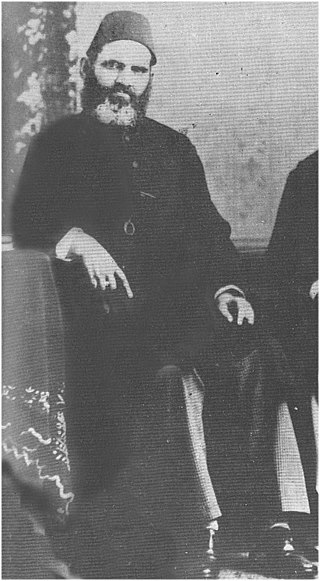
Nawab Mohsin-ul-Mulk, Munir Nawaz Jang, also known as Syed Mehdi Ali, was an Indian Muslim politician. He was a close friend of Syed Ahmed Khan, was involved in the Aligarh Movement and was one of the founders of the All India Muslim League in 1906.
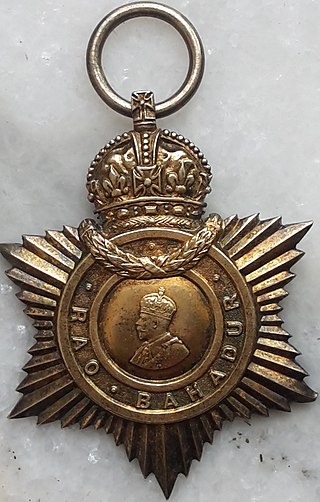
Rao Bahadur and Rai Bahadur, abbreviatedR.B., was a title of honour bestowed during British rule in India to individuals for outstanding service or acts of public welfare to the Empire. From 1911, the title was accompanied by a medal called a Title Badge. Translated, Rao means "King", and Bahadur means "Brave". Bestowed mainly on Hindus, the equivalent title for Muslim and Parsi subjects was Khan Bahadur. For Sikhs it was Sardar Bahadur.

The Bardhaman Raj, also known as Burdwan Raj, was a zamindari Raja estate that flourished from about 1657 to 1955 in the Indian state of West Bengal. Maharaja Sangam Rai Kapoor, a Khatri from Kotli, Punjab, who was the first member of the family to settle in Bardhaman, was the original founder of the house of Bardhaman, whereas his grandson Abu Rai, during whose time the zamindari started flourishing, is considered to be the patriarch of the Bardhaman Raj family.
The All India Muhammadan Educational Conference was an organisation promoting modern, liberal education for the Muslim community in India. It was founded by Sir Syed Ahmed Khan, also the founder of the Aligarh Muslim University. All India Mumammadan Educational Conference was the origin of the All-India Muslim League. The Muslim League was born in the 20th session of All India Muhammadan Educational Conference, which was established by Syed Ahmed Khan in Aligarh in 1886. Muhammadan Educational Conference used to hold its annual meetings in various cities where, by the co-operation of local Muslims, steps were taken for the progress of education.

Nawab Sir Khwaja Salimullah Bahadur was the fourth Nawab of Dhaka and one of the leading Muslim politicians during the British rule in India.

The Nawab of Dhaka, originally spelt in English Nawab of Dacca, was the title of the head of one of the largest Muslim zamindar in British Bengal and Assam, based in present-day Dhaka, Bangladesh. The title of nawab, similar to the British peerage, was conferred upon the head of the family by Queen Victoria as a recognition of the first Nawab's loyalty and contribution to the social welfare activities.

The Imperial Legislative Council (ILC) was the legislature of British India from 1861 to 1947. It was established under the Charter Act of 1853 by providing for the addition of 6 additional members to the Governor General Council for legislative purposes. Thus, the act separated the legislative and executive functions of the council and it was this body within the Governor General's Council which came to known as the Indian/Central Legislative Council. In 1861 it was renamed as Imperial Legislative Council and the strength was increased.

Ubaidullah Al Ubaidi Suhrawardy was a Bengali Islamic scholar, educationist and writer from Midnapore. He is often regarded as the Father of modern Islamic education in Bengal.

General elections were held in British India in 1934. The Indian National Congress emerged as the largest party in the Central Legislative Assembly.
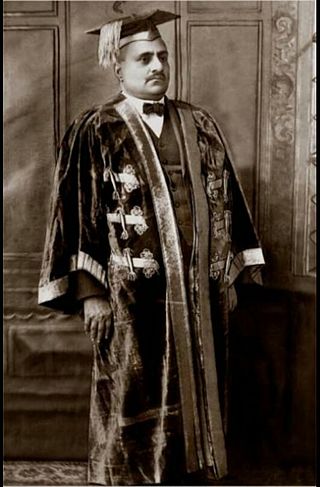
General elections were held in British India in 1920 to elect members to the Imperial Legislative Council and the Provincial Councils. They were the first elections in the country's modern history.
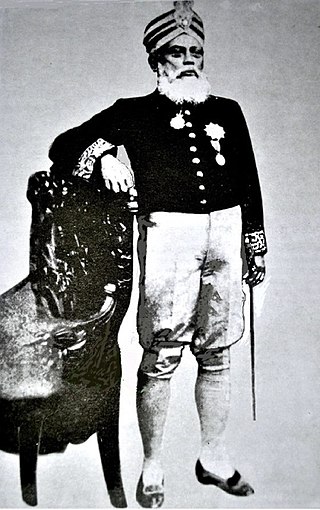
Syed Shamsul Huda (1862–1922) was a Muslim political leader of the Bengal Executive Council. He became the first British Indian Muslim President of the Legislative council in 1921. Huda was born in Gokarna, palace known as Gokarna Nawab Bari Complex Nasirnager, Brahmanbaria. It was the part of Comilla. Earlier known as greater Hill Tipperah. His father Syed Riazat Ullah was the editor of The Doorbeen, a Persian weekly journal.
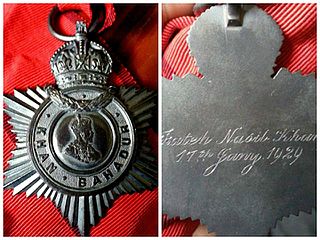
Khan Bahadur – a compound of Khan "Leader" and Bahadur "Brave" – was a formal title of respect and honor, which was conferred exclusively on Muslim and other non-Hindu natives of British India. It was one degree higher than the title of Khan Sahib.
Sir Abdul Karim Ghaznavi was a British Indian politician, traveler, minister, member of Bengal Governor's Executive Council, Bengal Provincial Council and Central Legislative Assembly, reformer of Muslim education and one of the pioneer of Muslim renaissance in Bengal. He was involved in Central National Mohammedan Association founded by Syed Ameer Ali.
The 1911 Delhi Durbar was held in December 1911 following the coronation in London in June of that year of King George V and Queen Mary. The King and Queen travelled to Delhi for the Durbar. For the occasion, the statutory limits of the membership of the Order of the Star of India and the Order of the Indian Empire were increased and many appointments were made to these and other orders. These honours were published in a supplement to the London Gazette dated 8 December 1911.
Baker Hostel is a government hostel located in Kolkata, West Bengal, India. The hostel was founded in 1910 during the rule of the British Raj by Edward Norman Baker, the then Lieutenant Governor of Bengal. The hostel is located at 8 Smith Lane in Taltala. It is for the male students of Maulana Azad College.
Ibrahim Suhrawardy (1896-1971) was an Indian educationist, author and linguist from Balasore, Odisha. He is credited to have written the first English grammar books in Odia for the native students. He achieved high distinction in English studies in British India and taught many generations of students and scholars how western languages could be pursued to great educational advantage. Ibrahim was also the first muslim from Orissa province to have qualified the prestigious Indian Civil Services Examinations in 1921. He was one of the active Satyagrahis during the Inchudi Satyagraha movement in 1930.














